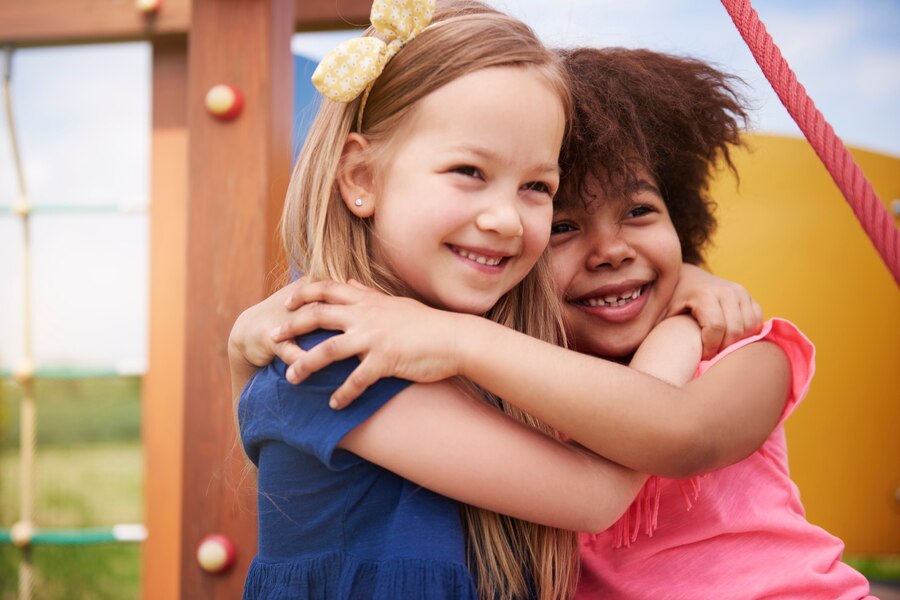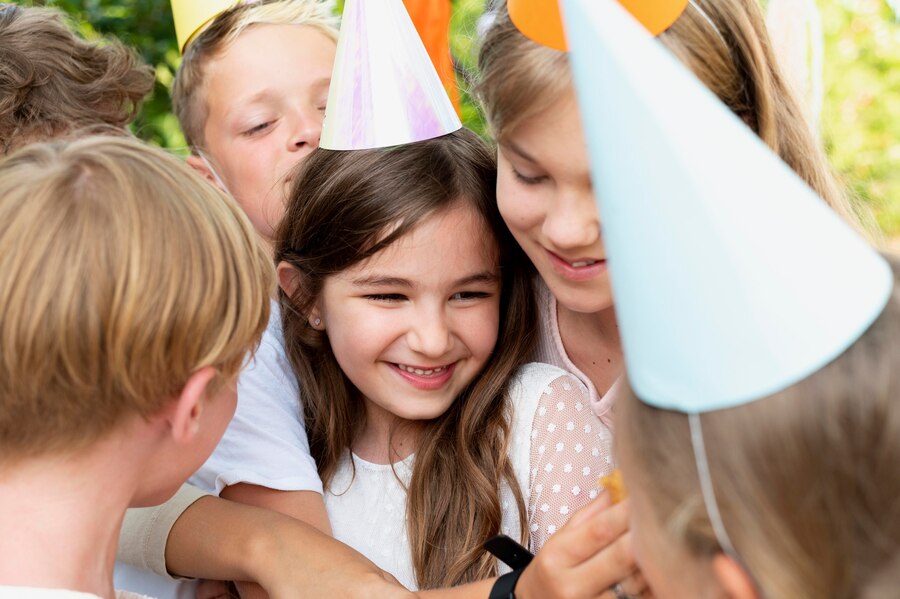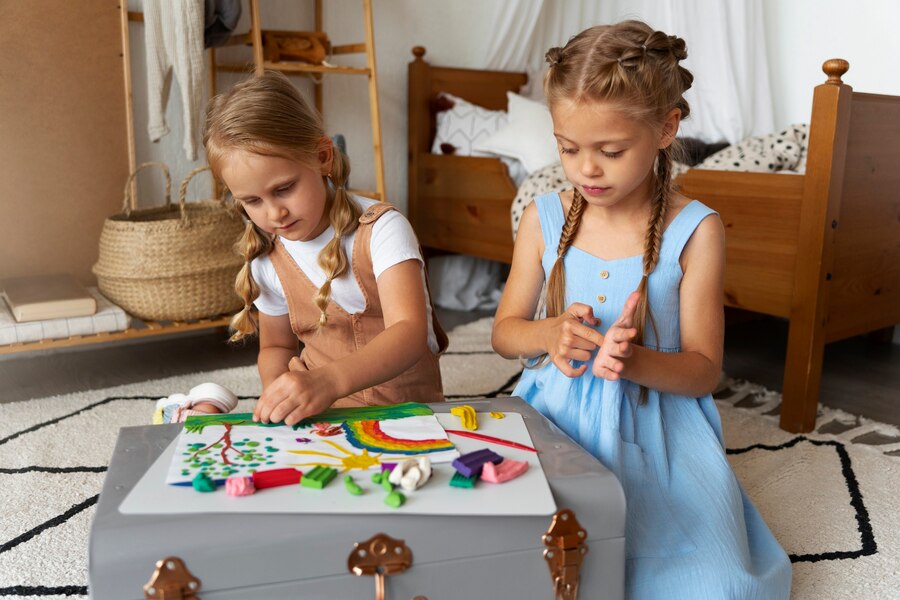Friendships are an essential part of a child’s development, and the nursery environment offers one of the first opportunities for young children to build these connections. Through play, children learn to communicate, cooperate, and understand the emotions of others—key building blocks for forming lasting friendships at nursery. As parents, it’s natural to wonder how your little one will manage in this new social world. Will they make friends? How will they handle sharing or taking turns? Rest assured, with gentle guidance and the right environment, your child will thrive socially and build meaningful friendships at nursery.
In this article, we’ll explore how friendships at nursery develop, the role of play in fostering social skills, and offer practical tips for helping your child build these early connections.
The Importance of Friendships at Nursery
Friendships at nursery are about more than just playdates and giggles. They lay the foundation for vital social skills such as communication, empathy, and conflict resolution. Children learn from each other, and these early friendships help them navigate the complexities of interacting with others.
Making friendships at nursery helps children:
- Build confidence: Interacting with peers in a safe and nurturing environment boosts a child’s self-esteem.
- Learn social rules: Through group activities, children start to understand concepts like sharing, taking turns, and respecting boundaries.
- Develop emotional intelligence: Friendships at nursery give children the opportunity to recognize and respond to their own and others’ emotions.
- Encourage independence: As children form their own friendships at nursery, they gradually become more independent from parents and caregivers, an important step in their development.
How Play Encourages Friendships at Nursery
Play is one of the most effective ways that children learn to socialize. Whether it’s building a tower together, chasing each other outside, or playing make-believe, these activities foster cooperation and communication. Here’s how different types of play help in developing friendships at nursery:
Parallel Play
In the early stages of nursery life, children often engage in parallel play—where they play side by side but not necessarily with each other. While it may seem like they’re not interacting, they’re actually observing and learning from one another. Over time, this leads to more direct social interaction, laying the groundwork for friendships at nursery.
Associative Play
As children grow, they begin associative play, where they start to share toys and ideas, although the play is still loosely organized. This is when friendships at nursery start to take shape, as children become more aware of each other and begin to seek out companionship.
Cooperative Play
By the time children reach cooperative play, they are truly working together. They plan activities, negotiate roles in pretend play, and solve problems together. This stage is where deep friendships at nursery are often formed, as children learn to communicate effectively and build trust with one another.
Practical Tips for Encouraging Friendships at Nursery
As a parent, there’s a lot you can do to help your child develop friendships at nursery. Here are some simple, practical tips to support your child’s social growth:
1. Model Positive Social Behavior
Children learn by watching the adults around them. Show kindness, patience, and respect in your own interactions, and your child will mimic these behaviors with their peers, helping them form strong friendships at nursery.
2. Encourage Playdates
Organizing playdates outside of nursery can help strengthen friendships at nursery. In a smaller, more familiar environment, children may feel more comfortable interacting one-on-one or in small groups, deepening their social connections.
3. Talk About Friendship
Help your child understand what it means to be a good friend. Use simple language to explain concepts like sharing, listening, and being kind. Reinforcing these ideas at home helps your child apply them when building friendships at nursery.
4. Celebrate Small Social Wins
If your child shares a toy or helps a friend, celebrate these moments! Positive reinforcement builds confidence and encourages your child to keep developing the social skills that are key to forming friendships at nursery.
5. Give Them Time to Adjust
Not all children are social butterflies right away. Some may take time to feel comfortable enough to engage with others. Be patient and give your child the space they need to find their own rhythm. Gradually, they’ll become more open to forming friendships at nursery.

Common Challenges in Building Friendships at Nursery
It’s important to acknowledge that building friendships at nursery isn’t always smooth. Here are some common challenges your child might face and how you can support them:
Shyness or Social Anxiety
Some children are naturally more reserved and may feel overwhelmed in a large group setting. If your child is shy, try smaller playdates or arrange for them to spend time with one or two children at a time. Encourage them gently, but don’t push them into interactions before they’re ready to form friendships at nursery.
Sharing and Taking Turns
Sharing is a skill that can be tricky for young children to master. It’s common for conflicts to arise over toys or turn-taking. You can help by practicing these skills at home and explaining that it’s okay to feel upset when they don’t get their way. Over time, your child will learn to compromise and cooperate, which are key elements of friendships at nursery.
Conflicts with Peers
It’s inevitable that children will sometimes disagree or have arguments with their friends. Teach your child how to express their feelings without hurting others and to resolve conflicts peacefully. Role-playing scenarios at home can be a helpful tool for practicing these conversations, which can improve their ability to maintain friendships at nursery.
The Role of Nursery Staff in Fostering Friendships
Nursery staff play a crucial role in guiding children’s social development and helping them build friendships at nursery. Teachers and caregivers not only supervise play but also step in to mediate conflicts, encourage cooperation, and model positive social behavior.
Facilitating Group Play
Nursery staff often organize group activities that promote teamwork, such as building blocks, art projects, or outdoor games. These structured play sessions are designed to encourage children to work together and build friendships at nursery naturally.
Observing and Supporting
Educators are trained to observe children’s interactions and step in when needed. If a child is having difficulty making friends or engaging with others, nursery staff will offer gentle guidance and support, helping them navigate social situations and form strong friendships at nursery.
The Benefits of Mixed-Age Interactions
Many nurseries offer mixed-age group settings, where younger and older children play together. These environments can be especially beneficial for fostering friendships at nursery:
- Learning from older peers: Younger children can learn social skills by observing and mimicking older children.
- Leadership for older children: Older children often take on leadership roles, helping younger ones learn the ropes, which builds their confidence and nurtures empathy.
- Encouraging patience and cooperation: In mixed-age settings, children are more likely to practice patience and cooperation, as the needs and abilities of their peers vary. These skills are crucial in building successful friendships at nursery.
How to Support Your Child After Nursery
Friendships at nursery don’t end when the school day does! To help your child continue to grow socially, keep the learning going at home:
Ask Open-Ended Questions
At the end of the day, ask your child about their interactions at nursery. Questions like “Who did you play with today?” or “What games did you play?” help your child reflect on their social experiences and keep the focus on friendships at nursery.
Provide Opportunities for Play
Social skills are developed through practice, so provide plenty of opportunities for your child to interact with others. Whether it’s at the park, at home, or during playdates, give your child the space to practice and refine the skills they’re learning at nursery, which will only strengthen their friendships at nursery.
Stay Connected with Other Parents
Building friendships at nursery isn’t just for the kids—connecting with other parents can lead to more playdates and strengthen your child’s social circle. It also gives you the chance to share advice and experiences with other caregivers.
What If Your Child Struggles to Make Friends?
If your child seems to struggle with making friendships at nursery, it’s important to approach the situation with care and patience. Every child develops social skills at their own pace, and some may need more time or support than others.
Here are a few steps you can take if your child is having difficulty building friendships at nursery:
- Talk to their teacher: Nursery staff can offer valuable insights into your child’s social interactions and may have suggestions for helping them engage more with their peers.
- Encourage one-on-one play: Some children find large groups overwhelming. Playdates with one child at a time may help your child feel more comfortable.
- Build confidence at home: Encourage activities that boost your child’s self-esteem, like role-playing social scenarios or practicing sharing and taking turns during family games.
Remember, forming friendships at nursery is a process, and with the right support, your child will eventually find their social groove.

The Long-Term Impact of Friendships at Nursery
The friendships at nursery are often a child’s first introduction to the social world, and the skills they learn here will serve them throughout their life. By learning to cooperate, communicate, and empathize with others, children are not only building friendships at nursery but also laying the groundwork for healthy relationships as they grow older.
These early social connections can also have a lasting impact on a child’s emotional well-being, helping them feel secure, supported, and confident as they navigate new environments and experiences.
To Sum Up
Fostering friendships at nursery is a key part of your child’s social development, and through play, children naturally learn how to communicate, share, and collaborate with others. While every child will approach socializing at their own pace, as parents, there’s plenty you can do to support their journey—from organizing playdates to modeling positive behavior. With patience, encouragement, and a nurturing environment, your child will develop the social skills they need to build lasting friendships at nursery and thrive in their nursery years and beyond.
Read Our Latest Article: Managing Separation Anxiety: Practical Tips for Parents of Nursery-Aged Children
Follow us

Pingback: Balancing Work and Nursery: Practical Tips for Working Parents - Purple Bees Child Care